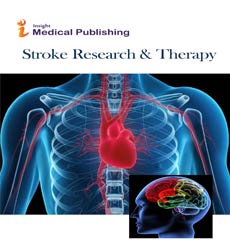Stem Cell and Nanotechnology-Based Therapies for Stroke in COVID-19
Setareh Soroudi
Department of Immunology, Mashhad University of Medical Sciences, Mashhad, Iran
DOI10.36648/ipsrt.8.3.213
Setareh Soroudi*
Department of Immunology, Mashhad University of Medical Sciences, Mashhad, Iran
- *Corresponding Author:
- Setareh Soroudi
Department of Immunology, Mashhad University of Medical Sciences, Mashhad,
Iran,
E-mail: setareh@gmail.com
Received date: August 27, 2024, Manuscript No. IPSRT-24-19848; Editor assigned date: August 29, 2024, PreQC No. IPSRT-24-19848 (PQ); Reviewed date: September 10, 2024, QC No. IPSRT-24-19848; Revised date: September 17, 2024, Manuscript No. IPSRT-24-19848 (R); Published date: September 24, 2024, DOI: 10.36648/ipsrt.8.3.213
Citation: Soroudi S (2024) Stem Cell and Nanotechnology-Based Therapies for Stroke in COVID-19. Stroke Res Ther Vol.8. No.3:213.
Description
The mainstay of current stroke treatment interventions is thrombolysis or thrombectomy nonetheless, post-stroke longterm neuroprotection and disruption of detrimental cellular processes remain important. A typical aftereffect of stroke is mitochondrial dysfunction, which sets off harmful biological processes that ultimately impair brain neuronal function. Thus, more research is needed to determine the best ways to preserve and repair mitochondrial activity in injured neurons. The treatment of ischemic stroke has showed considerable potential with stem cell therapy. Positive results from endovascularly delivered stem cells have been shown in preclinical and clinical settings in earlier research. When compared to intravenous treatment, Intra-Arterial (IA) administration offers a more efficient means of delivering cells to brain regions impacted by stroke. By providing new mitochondria to damaged neurons in the core and penumbra regions, infused stem cells may improve the life and longevity of neurons. In earlier research, our team showed that injecting IA 1×10^5 Mesenchymal Stem Cells (MSCs) into rats was both safe and efficient. The injections provided neuroprotection through the regulation of SIRT-1 mediated inflammasome signaling, the modulation of neuronal calcineurin, the reduction of endoplasmic reticulum stress, the amelioration of post-stroke edema and the reduction of cellular apoptosis.
Cerebrovascular accidents
Building on this, the purpose of our current work is to examine the possibility of IA MSCs for restoring and shielding mitochondria in damaged neurons following a stroke. Additionally, we aim to investigate the role of the SIRT-1/ RHOT-1/PGC-1α pathway in biogenesis, neuroprotection and mitochondrial transfer. With this work, we hope to lay the groundwork for stem cell therapy for ischemic stroke in the future. Cerebrovascular accidents, commonly referred to as strokes, are a major contributor to lifelong impairment and come with high financial and medical expenses. Both ischemia and hemorrhage can cause them, with ischemia strokes being the more frequent. These patients now have few therapy options, most of which center on acute-phase therapies. Stem cell-based cellular therapies have demonstrated potential in lessening or completely curing the symptoms of stroke in recent times. Because of their low antigenicity and capacity to differentiate into a variety of tissue types, including adipogenic, chondrogenic and osteogenic tissues, MSCs provide a great deal of therapeutic potential for illnesses of the nervous system. Using sources such as "ClinicalTrials.gov" and "PubMed," this study provides an extensive evaluation of the literature on current clinical trials that use MSCs to treat ischemic stroke. The need for novel therapeutic techniques has also been brought to light by the COVID-19 pandemic, particularly for severe respiratory consequences such as Acute Respiratory Distress Syndrome (ARDS).
Acute lung injury
Acute Respiratory Distress Syndrome (ARDS), which is defined by acute and atypical inflammatory reactions necessitating prompt medical attention, is associated with most COVID-19 deaths. According to recent research, MSC-based therapies may provide a secure and efficient means of treating severe respiratory diseases, such as Acute Lung Injury (ALI) and ARDS. MSCs and their exosomes have been shown to have antiinflammatory qualities, which are essential for cellular repair and communication. Studies suggest that MSCs and MSC-derived exosomes (MSC-exosomes) may improve alveolar fluid and microbial clearance while fostering endothelial and epithelial healing, which may improve lung function. This review centers on clinical research examining the function of MSCs and MSCexosomes in the management of COVID-19-related ARDS, including the application of MSC and anti-inflammatory drug delivery systems based on nanotechnology to improve treatment outcomes. In practical practice, effective wound healing is still quite difficult to achieve. Extracellular Vesicles (EVs) have therapeutic potential in this field, but their clinical application is constrained by problems with their targeting and stability. The production procedure for recombinant human collagen III (rhCol III) is stable and has a low rejection rate. Using a cross-linking technique, we created a Sodium Alginate (SA) hydrogel integrated with rhCol III that allowed for site-specific, sustained EV release. Assays for ROS production, cell viability and proliferation were carried out using MC3T3-E1 cell lines. The rhCol III/SA-EVs hydrogel, a delivery method with antiinflammatory and antioxidant capabilities, accelerates healing in diabetic wounds, which are marked by high levels of inflammation and oxidative stress. Studies conducted in vivo using a diabetic wound model demonstrated that the hydrogel considerably (p<0.05) sped up the healing process within 21 days, resulting in almost 95% wound closure without any negative systemic effects as compared to the control group.
Open Access Journals
- Aquaculture & Veterinary Science
- Chemistry & Chemical Sciences
- Clinical Sciences
- Engineering
- General Science
- Genetics & Molecular Biology
- Health Care & Nursing
- Immunology & Microbiology
- Materials Science
- Mathematics & Physics
- Medical Sciences
- Neurology & Psychiatry
- Oncology & Cancer Science
- Pharmaceutical Sciences
